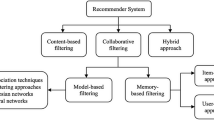Abstract
Due to a large amount of resources (i.e., information and knowledge) available on world wide web, it has been more difficult for users to effectively find relevant web resources. Most of the current web browsing methods and systems have been investigated to apply adaptive approaches which can extract personal contexts (e.g., interests and preferences) of the users. In this paper, we propose a contextual mashup-based collaborative browsing (co-browsing) platform, called ContextGrid, for providing online users with various knowledge sharing services. Particularly, the proposed mashup scheme can integrate heterogeneous pieces of information collected by various Open APIs, and assist the users to decide which partners should be selected for mutual collaborations. In order to evaluate the proposed mashup-based method, we have implemented a co-browsing platform which can exchange bookmarks, and measured whether the contextual mashup scheme makes a meaningful influence on improving the performance of the co-browsing process with multiple users.





Similar content being viewed by others
Notes
In terms of temporal and spatial characteristics, each co-browsing system can be either synchronous or asynchronous, and either local or remote.
References
Amant, R. St., Long, T., & Dulberg, M. S. (1998). Experimental evaluation of intelligent assistance for navigation. Knowledge-Based Systems, 11(1), 61–70.
Becker, C., & Bizer, C. (2009). Exploring the geospatial semantic web with dbpedia mobile. Journal of Web Semantics, 7(4), 278–286.
Belleau, F., Nolin, M.-A., Tourigny, N., Rigault, P., & Morissette, J. (2008). Bio2rdf: Towards a mashup to build bioinformatics knowledge systems. Journal of Biomedical Informatics, 41(5), 706–716.
Cheung, K.-H., Yip, K. Y., Townsend, J. P., & Scotch, M. (2008). Hcls 2.0/3.0: Health care and life sciences data mashup using web 2.0/3.0. Journal of Biomedical Informatics, 41(5), 694–705.
De Longueville, B. (2010). Community-based geoportals: The next generation? concepts and methods for the geospatial web 2.0. Computers, Environment and Urban Systems, 34(4), 299–308.
Dömel, P. (1995). Webmap: A graphical hypertext navigation tool. Computer Networks and ISDN Systems, 28(1–2), 85–97.
Domingue, J., Dzbor, M., & Motta, E. (2004) Collaborative semantic web browsing with magpie. In C. Bussler, J. Davies, D. Fensel, & R. Studer (Eds.), Proceedings of the 1st European semantic web symposium (ESWS 2004), May 10–12. Lecture Notes in Computer Science (Vol. 3053, pp. 388–401). Heraklion, Crete, Greece: Springer.
Joachims, T., Freitag, D., & Mitchell, T. (1997). Webwatcher: A tour guild for the world wide web. In Proceedings of the 15th international joint conference on artificial intelligence (pp. 770–775).
Jung, J. J. (2005). Collaborative web browsing based on semantic extraction of user interests with bookmarks. Journal of Universal Computer Science, 11(2), 213–228.
Jung, J. J. (2008a). Ontology-based context synchronization for ad-hoc social collaborations. Knowledge-Based Systems, 21(7), 573–580.
Jung, J. J. (2008b). Query transformation based on semantic centrality in semantic social network. Journal of Universal Computer Science, 14(7), 1031–1047.
Jung, J. J. (2009). Knowledge distribution via shared context between blog-based knowledge management systems: A case study of collaborative tagging. Expert Systems with Applications, 36(7), 10627–10633.
Jung, J. J. (2010a). An empirical study on optimizing query transformation on semantic peer-to-peer neworks. Journal of Intelligent & Fuzzy Systems, 21(3), 187–195.
Jung, J. J. (2010b). Reusing ontology mappings for query segmentation and routing in semantic peer-to-peer environment. Information Sciences, 180(17), 3248–3257.
Jung, J. J. (2011a). Service chain-based business alliance formation in service-oriented architecture. Expert Systems with Applications, 38(3), 2206–2211.
Jung, J. J. (2011b). Boosting social collaborations based on contextual synchronization: An empirical study. Expert Systems with Applications, 38(5), 4809–4815.
Koo, C., Wati, Y., & Jung, J. J. (2011). Examination of how social aspects moderate the relationship between task characteristics and usage of Social Communications Technologies (SCTs) in organizations. International Journal of Information Management, 31(5), 445–459.
Lieberman, H., van Dyke, N., & Vivacqua, A. (1999). Let’s browse: A collaborative browsing agent. Knowledge-Based Systems, 12(8), 427–431.
Lieberman, H., Nardi, B. A., & Wright, D. J. (2001). Training agents to recognize text by example. Autonomous Agents and Multi-Agent Systems, 4(1–2), 79–92.
Maes, P. (1994). Agents that reduce work and information overload. Communications of ACM, 37(7), 31–40.
Mason, R., & Rennie, F. (2007). Using web 2.0 for learning in the community. The Internet and Higher Education, 10(3), 196–203.
Rodden, T. (1991). A survey of cscw systems. Interacting with Computers, 3(3), 319–354.
Twidale, M., & Nichols, D. (1998). Computer supported cooperative work in information search and retrieval. Annual Review of Information Science and Technology, 33, 259–319.
Acknowledgements
This work was supported by the National Research Foundation of Korea (NRF) grant funded by the Korea government (MEST) (No. 2011-0017156).
Author information
Authors and Affiliations
Corresponding author
Rights and permissions
About this article
Cite this article
Jung, J.J. ContextGrid: A contextual mashup-based collaborative browsing system. Inf Syst Front 14, 953–961 (2012). https://doi.org/10.1007/s10796-011-9315-z
Published:
Issue Date:
DOI: https://doi.org/10.1007/s10796-011-9315-z




